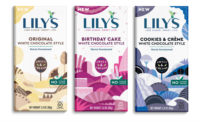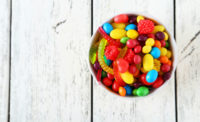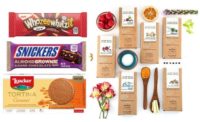State of the Industry
State of the Candy Industry 2021: Better-for-you, reduced-sugar treats gain momentum
Healthier chocolates are seeing strong sales, while non-chocolate diet candy reflects complicated impact of pandemic.

There should probably be a saying in the confectionery industry that goes “if you want to know what’s going on in candy, watch Hershey.”
The company has a history of evolving to keep up with changing consumer preferences, making acquisitions that are perfectly in line with current trends.
In 2011, Hershey acquired Brookside Foods, known for its dark chocolate with exotic fruit-juice centers, right as interest in flavanols and antioxidants were peaking. In 2017, the company acquired Amplify Snack Brands, makers of SkinnyPop, just as popcorn was having a moment.
Hershey’s latest acquisition is just as prescient. On June 25, the company completed its acquisition of Lily’s Confectionery for a purchase price of $425 million. The company is known for its better-for-you and reduced-sugar chocolates.
"Lily's is a great addition to Hershey's growing portfolio of better-for-you snacking brands, and we are excited to add this high-growth, leading BFY brand and to get to work with its talented and innovative team," said Chuck Raup, president U.S. "Lily's popular low-sugar products are a great strategic fit with our multi-pronged better-for-you snacking strategy and will perfectly complement our existing iconic Hershey's BFY offerings."
And yes, better-for-you and reduced sugar are having a moment in the candy industry.
For proof, look no further than Lily’s sales data. The company has indeed been “high growth” as Raup put it.
The most recent IRI data, which looked at the latest 52 weeks of sales ending June 13, 2021 — a couple of weeks before Hershey finalized its acquisition of Lily’s on June 25 — showed Lily's Sweets as the No. 2 selling sugar-free chocolate candy manufacturer, with $39.9 million in sales. That's up 50.7 percent compared to a year ago.
The company was behind only Russell Stover, which had $137.9 million in sales of sugar-free chocolate, up 19.1 percent over the last year.
The Hershey Co. ranked third among companies for sugar-free chocolate candy sales, with $29.1 million, up 32 percent over the last year. Rounding out the Top 5 sugar-free chocolate manufacturers were No. 4 Whitman's Chocolates, with $2.9 million in sales; and No. 5 HealthSmart Foods Inc., with $1.4 million in sales.
But it's difficult to get a feel for how things are really going when comparing data to summer 2020 because of the pandemic’s massive impact.
According to pre-pandemic IRI data, which looked at the latest 52 weeks ending Sept. 8, 2019, Lily's growth is even more impressive.
At the time in 2019, Lily’s had just $19.5 million in sales, and that was up 142.2 percent. It was still behind Hershey then, which had $23.4 million in sales for sugar-free chocolate. Russell Stover held the top spot then too, with $102 million in sales, up 13.8 percent over the previous year. Whitman's Chocolates had $2.7 million in sales, while HealthSmart Foods Inc. had $1.5 million in sales.
The fact that Russell Stover’s sales are up $35.9 million since Sept. 2019 is just one more indicator that better-for-you chocolate is doing well.
Russell Stover also launched reduced-sugar chocolate bars this year. The company’s Joy Bites aren’t all sugar free, and instead they are marketed as being made “without added sugar.”
Made with plant-based stevia extract, they come in the following filled and solid varieties:
- Caramel in Chocolate
- Peanut Butter in Chocolate
- Smooth Creamy Chocolate
- Sea Salt Caramel in Dark Chocolate
- Roasted Almonds in Dark Chocolate
While the Roasted Almost in Dark Chocolate has 0 grams of total sugar, the Peanut Butter in Chocolate bar has 1 gram of total sugar, and the Sea Salt Caramel in Dark Chocolate and Caramel in Chocolate bars both have 3 grams of sugar listed on the label. The nutritional information for the Smooth Creamy Solid Chocolate bar did not appear to be listed online.
“With 100 years of experience making high quality chocolate, we are better equipped than most to deliver great tasting chocolate without all of the added sugar," said Jill Beveridge, v.p. of innovation and development at Russell Stover. "We have received an extremely positive response to the Joy Bites collection from our customers and from consumers. Joy Bites highlight Russell Stover's consumer-focused commitment to innovation and creativity, and we look forward to continuing to introduce new and exciting products to this collection."
For it’s part, Hershey’s has done more than acquire Lily’s to show its commitment to the better-for-you sector.
Over the course of the last year, the candy company relaunched its sugar-free chocolates and released new organic versions of some of its iconic brands, including: Hershey’s, Hershey’s Special Dark, Reese’s, and Reese’s Dark. The company also emphasized its better-for-you options in a recent corporate blog post by Eric Newton, Hershey’s brand manager, strategic growth platforms.
“We use the phrase ‘better for you’ to refer to the products that help consumers make relative snacking choices that fit their lifestyles,” Newton wrote. “We understand the decisions we make around eating aren’t black and white; they’re different for each and every family and individual. For some, making better-for-you choices means limiting serving sizes. I think of Hershey's Kisses as our original portion-control chocolate, for example. At just 25 calories per individually wrapped Kiss, you can have one, or a handful, depending on what suits you. More recently, we’ve introduced our line of THiNS as a portioned option to give people a satisfying taste of what they love... All of our individually wrapped THiNS offer a petite version of a favorite, wrapped and ready for any moment.”
Specifically, the company has launched Reese’s THiNS, York THiNS, and Kit Kat THiNS.
“Consumers' needs are changing, and more people are looking for better-for-you snacking options that offer the delicious taste and textures of their favorite brands,” Newton wrote. “As more consumers look to reduce sugar or opt for organic, we’ve got them covered.”
Another notable better-for-you launch this year was the low-sugar chocolate bars and peanut butter cups from SkinnyDipped, known for its thinly-dipped almonds, peanuts and cashews. The products deliver indulgence with less sugar by sweetening with maple sugar, cane sugar, allulose.
“Consumers are looking to reduce sugar but don’t want to sacrifice flavor or enjoyment and are becoming increasingly aware of the impact of sweeteners like stevia and erythritol on taste and gut health,” said SkinnyDipped CEO Breezy Griffith. “Our promise has always been out-of-this-world taste, less sugar, and an ingredient label you can feel great about. Our new cups and bars continue to deliver on this — they’re mind blowingly good, have only 2-4g of sugar and leave no unpleasantness from stevia, sugar alcohols or artificial sweeteners. They’re game changers.”
The full line-up includes the Dark Chocolate Almond Sea Salt Bar, Dark Chocolate Salted Caramel Bar, Dark Chocolate Peanut Butter Cups, and Milk Chocolate Peanut Butter Cups.
Sugar-free non-chocolate sector sees mixed results
Of course, sugar-free candy goes beyond chocolate. Here, the complicated impact of the pandemic is more apparent.
Overall, according to the IRI data looking at the latest 52 weeks ending June 13, 2021, the sugar-free diet candy category has seen $90.7 million in sales, down about 1.8 percent.
The Top 5 brands in the category have had a mix of sales growth and decline, including:
- Storck Werther's Original Sugar-Free, with $47.6 million in sales, up 12.2 percent.
- Lifesavers Sugar-Free, with $13.9 million in sales, down 24 percent.
- Jolly Rancher Sugar-Free, $7.2 million, up 31.7 percent.
- Brach's Sugar-Free, with $6.2 million in sales, up 8.7 percent.
- Private Label Sugar-Free $2.4 million in sales, down 27.4 percent.
Again, it’s noteworthy to look at how the category’s sales compare to 2019, before COVID-19 impacted sales.
Looking at IRI data for the latest 52 weeks ending Sept. 8, 2019, back then the sugar-free diet candy category had $91.1 million in sales, up 0.2 percent at the time.
In September 2019, the Top 5 brands were the same, but in a slightly different order. They included:
- Storck Werther's Original Sugar-Free, with $35.1 million in sales
- Lifesavers Sugar-Free, with $19.9 million in sales
- Brach's Sugar-Free, with $6.2 million in sales
- Jolly Rancher Sugar-Free, $5.8 million in sales
- Private Label Sugar-Free $4 million in sales
It’s noteworthy that in 2019, Lifesavers Sugar-Free had $19.9 million sales, which was up 3.1 percent at the time. That’s about $6 million more than the brand had listed in the 2021 data.
While Lifesavers are not technically a gum or a mint, they are often stocked in the same section of the candy shelf. So the brand was no doubt hurt by the same factors that have impacted gum and mints during the pandemic. Namely, that fewer people were leaving the house for school and work, making them less likely to stop into a store to grab gum and mints.
The uneven growth in sugar-free diet candy is also a reflection of consumer’s complicated emotions about the category.
In June 2021, FONA released a report titled "Sugar: The Voice of the Consumer" analyzing the results of its nationwide survey about sugar and then comparing the findings to a similar study FONA did in 2019.
The report showed that 50 percent of consumers wanted to reduce their sugar consumption, which was up 8 percent from 2019. However, 54 percent of consumers FONA surveyed are consuming the same amount of sugar that they were one year ago.
FONA’s survey also revealed that 70 percent of consumers stated that taste was more important than grams of sugar per serving. And 62 percent of consumers stated that price is more important than grams of sugar per serving.
In other words, even if consumers claim they want more sugar-free options, they don’t always follow through on the hopes they have for themselves. It’s a tricky position for candy companies to navigate, which are tasked with creating the impossible: Healthy sweets that taste unhealthy.
That hasn’t stopped companies from trying, though.
In the last year, some of the more notable non-chocolate better-for-you launches included:
Project 7’s expansion of its low-sugar candy line with the addition of two new products: Sour Apple Rings and Sour Gummy Worms. Project 7’s Sour Apple Rings and Sour Gummy Worms contain 3 grams of sugar, 6 net carbs, and 60 calories per bag.
YumEarth's Chewys, which are available in four flavors — Lemon, Orange, Strawberry and Cherry — and are free of the Top 8 allergens. They’re also vegan, gluten-free and made with simple, organic ingredients.
SmartSweets’ Red Twists, which are sweetened without added sugars, sugar alcohols and artificial sweeteners. Each 1.8-oz. bag of Red Twists contains 12 grams of fiber and 2 grams of sugar per bag.
Speaking of licorice, there was also a major acquisition in the category in early 2021. American Licorice Co., maker of the Red Vines and Sour Punch brands, acquired the Torie & Howard brand. Torie & Howard was co-founded by Torie Burke and Howard Slatkin in 2012 with a pledge to produce health-friendly and socially conscious treats.
At the time John Kretchmer, CEO of American Licorice, said the Torie & Howard brand is a strong compliment to Red Vines Made Simple, an all-natural, Non-GMO Project certified line of products.
The move was in line with other recent American Licorice investments, including a minority investment in Theo Chocolate Inc. and an investment in Mindful Nourishment, LLC, the creators of the nutritional snack Zing bars.
It’s an exciting time in the better-for-you candy space, and it will be interesting to see how consumers respond to the new products and innovations hitting the market. Only time will tell how committed consumers are to their health long-term, but in the short term, the category offers opportunities for candy companies looking to innovate in a more health-conscious space.
Looking for a reprint of this article?
From high-res PDFs to custom plaques, order your copy today!







